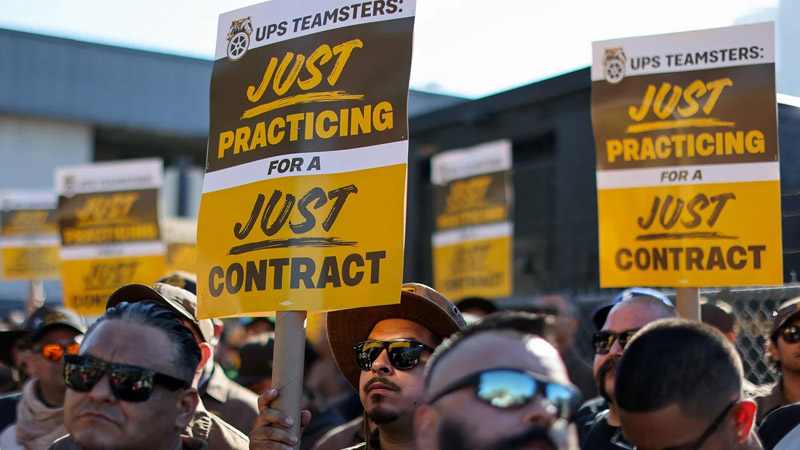UPS, Teamsters Reach Tentative Deal to Avert Nation’s Largest-Ever Single Employer Strike

Mike Blake/Reuters
A potential strike by United Parcel Service (UPS) employees, which could have led to severe economic consequences due to UPS handling 9% of the US GDP annually, has been tentatively averted. If the strike had occurred, the US Chamber of Commerce projected it would have cost $3.8 billion per day.
The announcement of a tentative agreement between UPS and the International Brotherhood of Teamsters (IBT) came just before the expiration of the current contract. The labor union stated on Tuesday that a $30 billion contract has been proposed for a period of five years, pending approval to prevent a strike decisively.
According to the union’s statement, the agreement includes a significant wage increase for UPS employees, including part-time delivery drivers. The latter group’s exclusion from a wage raise due to a two-tier system implemented by the company had previously caused negotiations to break down.
“We demanded the best contract in the history of UPS, and we got it,” said Teamsters General President Sean M. O’Brien. “This contract sets a new standard in the labor movement and raises the bar for all workers.”
The proposed contract also designates Martin Luther King, Jr. Day as a paid holiday for all employees, prohibits driver-facing cameras in truck cabins, and rules out obligatory overtime work on drivers’ scheduled days off.
UPS CEO Carol Tomé lauded the agreement, describing it as a “win-win-win.”
UPS has reportedly agreed to pay new part-time workers $21 an hour, up from the $16.20 they start at presently. Existing workers will also get a raise of $7.50 per hour over the next five years, $2.75 of which will happen before the year is out. In addition, 7,500 part-time driving positions will now become full-time positions.
In a nearly unanimous vote last month, the Teamsters had authorized a strike, which would have commenced on August 1 without this new agreement. This strike would have been the most extensive single-employer strike in US history, with approximately 340,000 UPS employees ready to walk out.
In solidarity with the Teamsters, the UPS delivery aircraft pilots, represented by a different union, declared they would also refuse to work. A similar stance was observed during the last Teamsters strike for a UPS contract in 1997.
“This agreement continues to reward UPS’s full- and part-time employees with industry-leading pay and benefits while retaining the flexibility we need to stay competitive, serve our customers and keep our business strong,” Tomé said.The contract agreement is a significant development, particularly as actors represented by SAG-AFTRA and writers represented by WGA continue their strikes in Hollywood. They are protesting against several shared concerns, including the effects of AI on film and TV production, and the impact of streaming platforms on their industry.


